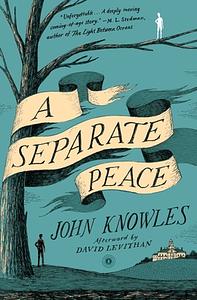You need to sign in or sign up before continuing.
Take a photo of a barcode or cover
emotional
reflective
medium-paced
Evidently everyone else had to read this one in high school, but since I did not, I thought it was time to give it a go. I probably would've felt differently about this had I read it in high school. Reading it as an adult, I admired Knowles' execution but couldn't manage to get emotionally invested. I think I would feel similarly rereading Catcher in the Rye nowadays. You have to hit both books at the right age for them to have a profound impact, and I missed my window for A Separate Peace. Still, three stars for some talented writing.
I can't remember my exactly feelings when I read this book in high school. But I just spent the day reading this, and I'll be spending the rest of the day ugly sobbing.
mysterious
reflective
tense
Plot or Character Driven:
Character
Loveable characters:
Complicated
Flaws of characters a main focus:
Yes
slow-paced
challenging
dark
emotional
sad
tense
medium-paced
Plot or Character Driven:
Character
Strong character development:
Yes
Loveable characters:
No
Diverse cast of characters:
No
Flaws of characters a main focus:
Yes
dark
emotional
reflective
slow-paced
Plot or Character Driven:
Character
Strong character development:
Complicated
Loveable characters:
Complicated
Diverse cast of characters:
No
Flaws of characters a main focus:
Yes
This book was by no account bad, but it wasn't particularly good at anything that it tried to do.
My first impression of this novel was that it represented a much younger version of an Evelyn Waugh novel, but lacking Waugh's characteristic wit and subtlety. Knowles' tale of private school boys, however, lacks the satirical tone and scathing eye of a novelist like Waugh or Mitford; the novel is void of women, and void of any character of a lower-class, such that it appears that Knowles is just writing of a very narrow and claustrophobic world. Which, indeed, is perhaps the world of boys - but I think that L.P Hartley's 'The Go-Between' does a far better job at depicting the idiosyncrasies of such a youthful world with a far more delicate and precise hand. Knowles explores the bursting of the bubble of youth in an interesting, but unoriginal, way, and overall I finished this book left feeling like I'd read a worse version of a novel I've read many times before.
Leviathan's afterword draws attention to the implicit desire between the two boys, and it is true that there are moments of touching tenderness between them that are explored with some skill, but I just don't think that this subtext is handled here nearly as well as it is elsewhere.
Overall, this is just a very mediocre book. I refrain from calling it bad, because I don't think it is actually bad, but I could hardly call it good and I certainly cannot recommend it at all enthusiastically.
My first impression of this novel was that it represented a much younger version of an Evelyn Waugh novel, but lacking Waugh's characteristic wit and subtlety. Knowles' tale of private school boys, however, lacks the satirical tone and scathing eye of a novelist like Waugh or Mitford; the novel is void of women, and void of any character of a lower-class, such that it appears that Knowles is just writing of a very narrow and claustrophobic world. Which, indeed, is perhaps the world of boys - but I think that L.P Hartley's 'The Go-Between' does a far better job at depicting the idiosyncrasies of such a youthful world with a far more delicate and precise hand. Knowles explores the bursting of the bubble of youth in an interesting, but unoriginal, way, and overall I finished this book left feeling like I'd read a worse version of a novel I've read many times before.
Leviathan's afterword draws attention to the implicit desire between the two boys, and it is true that there are moments of touching tenderness between them that are explored with some skill, but I just don't think that this subtext is handled here nearly as well as it is elsewhere.
Overall, this is just a very mediocre book. I refrain from calling it bad, because I don't think it is actually bad, but I could hardly call it good and I certainly cannot recommend it at all enthusiastically.
A Separate Peace is the story of Gene Forrester. He is a quiet, intellectual student at Devon School and his best friend and roommate is the polar opposite. Whereas Gene can keep up as an athlete, his real strength resides with academics. His roommate can be described as everything else.
Finny is charming, self-confident, athletic, and a daredevil without ever being arrogant. It is as if he knows himself to be extraordinary, but wears it like someone might wear a jacket. He doesn't have any inclination to best or defeat anyone. He merely enjoys competing with himself, relishing the idea that others might join in his long list of personal challenges.
At the opening, it seems Gene admires these qualities. But by the fourth chapter, he become conscious of his secret and growing resentment toward Finny. He is weary of Finny being the natural leader, the better athlete, and the more charismatic student who can talk his way out of anything.
At the dark heart of A Separate Peace, identity and transformation become pivotal themes. They are not just important for these two boys but several other classmates as well. As a summer of innocence metamorphoses into the winter of discontent, Elwin "Leper" Lepellier becomes the boy to enlist in the military and Brinker Hadley finds room to assert himself as a new leader at Devon.
Finny is charming, self-confident, athletic, and a daredevil without ever being arrogant. It is as if he knows himself to be extraordinary, but wears it like someone might wear a jacket. He doesn't have any inclination to best or defeat anyone. He merely enjoys competing with himself, relishing the idea that others might join in his long list of personal challenges.
At the opening, it seems Gene admires these qualities. But by the fourth chapter, he become conscious of his secret and growing resentment toward Finny. He is weary of Finny being the natural leader, the better athlete, and the more charismatic student who can talk his way out of anything.
At the dark heart of A Separate Peace, identity and transformation become pivotal themes. They are not just important for these two boys but several other classmates as well. As a summer of innocence metamorphoses into the winter of discontent, Elwin "Leper" Lepellier becomes the boy to enlist in the military and Brinker Hadley finds room to assert himself as a new leader at Devon.






